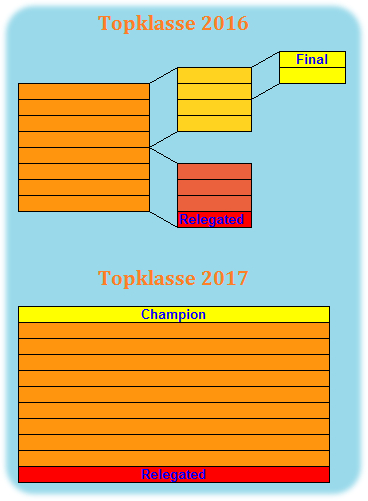So Don Quixote's managed to topple his windmill. Score one for nostalgic and the nervous.
This coming season's Topklasse will be the last to feature championship and relegation play-off phases, and the last to feature a final. From 2017 the Dutch top division will revert to a simple ten-team league structure.The eight-team format introduced in 2010, long the bugbear of the reactionary and relegation-shy, is to be consigned to history. The question is, why?
An enquiry to the KNCB as to the rationale behind the decision has as yet gone unanswered, and though the well-worn arguments for
and against are hardly a secret, the last time the issue was raised the proposed reversion was quickly dismissed - and for good reason. The quality of what is currently one of the strongest club competitions anywhere in the Northern Hemisphere cannot help but be diluted by the move. Last season the newly-promoted HBS, fresh from topping a tense eight-team Hoofdklasse, embarked on a 13 game losing streak in the Topklassse - finishing the season with just one win - so demoralised that they struggled to field even ten men in their last few games. It takes a particularly perverse mindset to look back on this display and think "Yeah. We need more of that."
The quality of what is currently one of the strongest club competitions anywhere in the Northern Hemisphere cannot help but be diluted by the move. Last season the newly-promoted HBS, fresh from topping a tense eight-team Hoofdklasse, embarked on a 13 game losing streak in the Topklassse - finishing the season with just one win - so demoralised that they struggled to field even ten men in their last few games. It takes a particularly perverse mindset to look back on this display and think "Yeah. We need more of that."
The truth is that all the return of the ten-team Topklasse achieves is to safeguard newly-mid-table teams from going down. The genuinely thrilling four-way relegation battle of 2014 is pretty much guaranteed to be a thing of the past. Instead we'll be treated to a two or just possibly three team relegation battle starting from the first match of the season and likely settled well before the close.
But there it is. At the behest of the more short-sighted clubs - depressingly in the overwhelming majority - the first act of Betty Timmer's newly elected board will be to introduce two more teams to the Topklasse who have little hope of competing, there only to serve as a safety net for the struggling old guard - which presumably is exactly the point. For a supposedly "forward-looking" board to take such a decisive step backwards rather gives the impression that they can't see where they're going.
Gone will be the climax of a national final which - despite the muddled compromise of a best-of-three format and occasionally inclement weather - has been reliably one of the best-attended fixtures of the Dutch cricket calendar.
 The late-season split of the league into championship and relegation play-offs, which has worked so well to inject some tension into the mid-table later in the summer, has also been cheerily abolished. Bafflingly, the chief justification for this seems to be that a straight league system will produce fewer dead rubbers. Which of course it won't.
The late-season split of the league into championship and relegation play-offs, which has worked so well to inject some tension into the mid-table later in the summer, has also been cheerily abolished. Bafflingly, the chief justification for this seems to be that a straight league system will produce fewer dead rubbers. Which of course it won't.
The major selling-point of the play-off system - pitting teams against those ranked nearest to them at the close of the season - is that more teams remain in contention for both relegation and the championship deeper into the season. A straight league system, all other things being equal, will produce considerably more meaningless games than almost any other conceivable format. This is not a matter of opinion, it is simple mathematics. Those who argue the contrary are wrong. They are entitled to their mistaken opinion, I suppose, but they are not entitled to be taken seriously.
A slightly less misinformed defense that's been floating about is that relieving the relegation pressure on the lower end of the Topklasse will allow clubs to concentrate on secondary priorities. With a season's grace and a two-team buffer against relegation Topklasse clubs should be able to concentrate on youth development, and won't feel pressured to hire in expensive foreign signings in order to compete.
 But this reasoning only makes sense if one accepts the credulity-straining premise that avoiding relegation should be the first and foremost priority of every Topklasse club - and that if this goal can't be achieved on the field then securing it in the boardroom serves just as well.
But this reasoning only makes sense if one accepts the credulity-straining premise that avoiding relegation should be the first and foremost priority of every Topklasse club - and that if this goal can't be achieved on the field then securing it in the boardroom serves just as well.
The fact is that this is not premiership football. Relegation does not result in some catastrophic financial calamity. There are no gate reciepts to be lost. You're not missing out on a slice of the lucrative TV rights. Your star players don't have relegation-release clauses in their million-dollar contracts. It does not matter.
Except of course that to the people that matter, it does matter - and sadly these seem to be the sort of people who'd be content to play musical deck-chairs on the Titanic, convinced that when Nearer my God to Thee cuts out everything will be just fine so long as there's enough chairs for everyone.